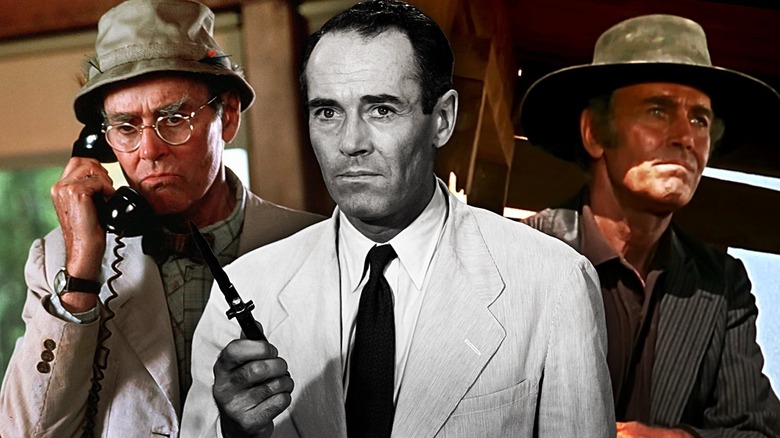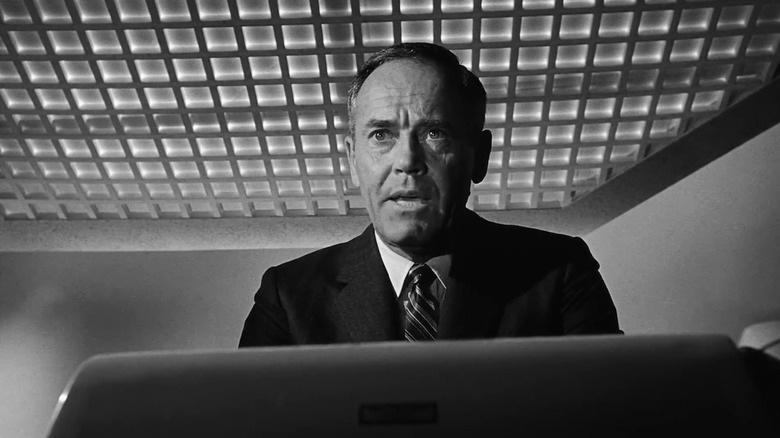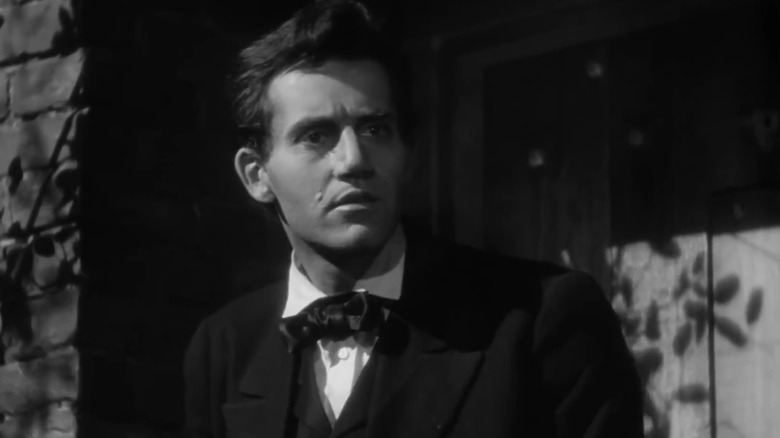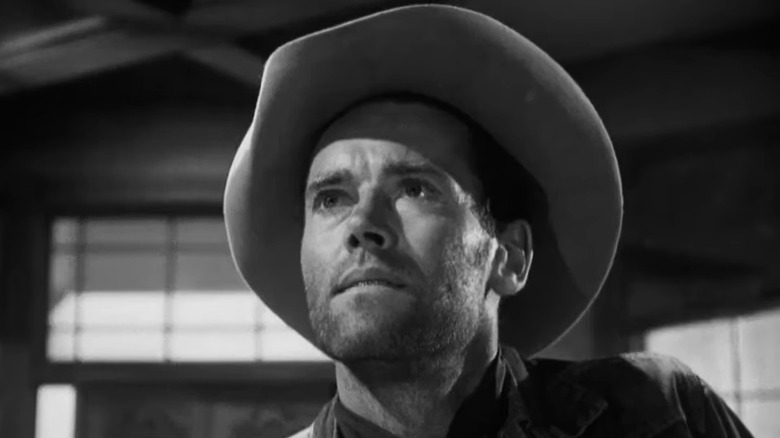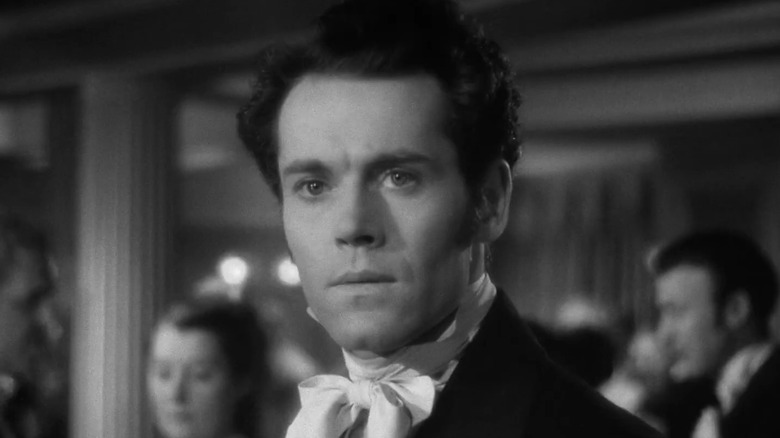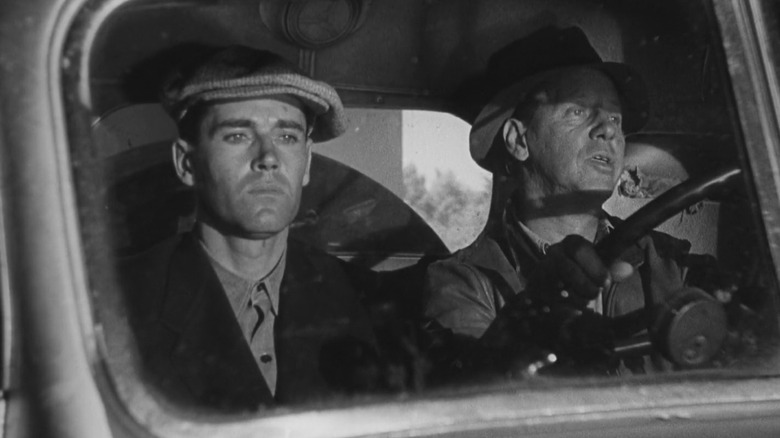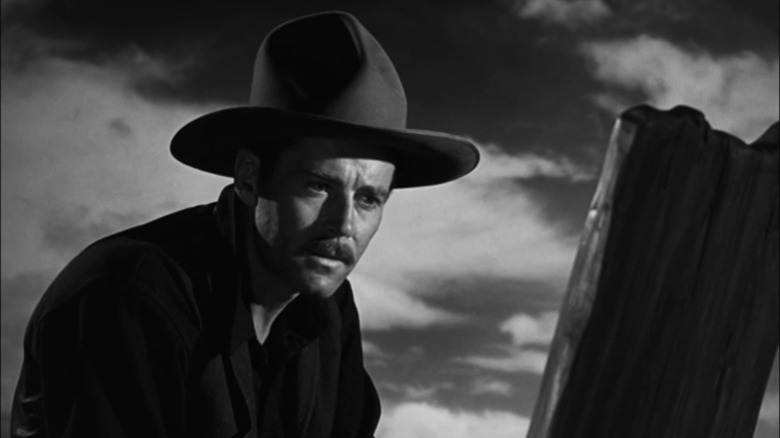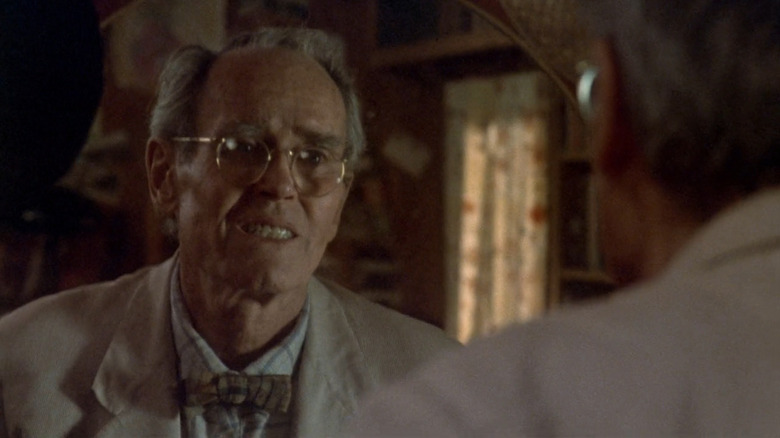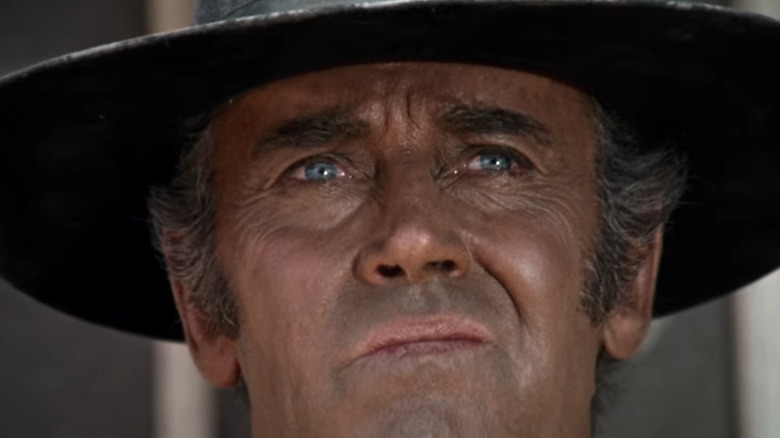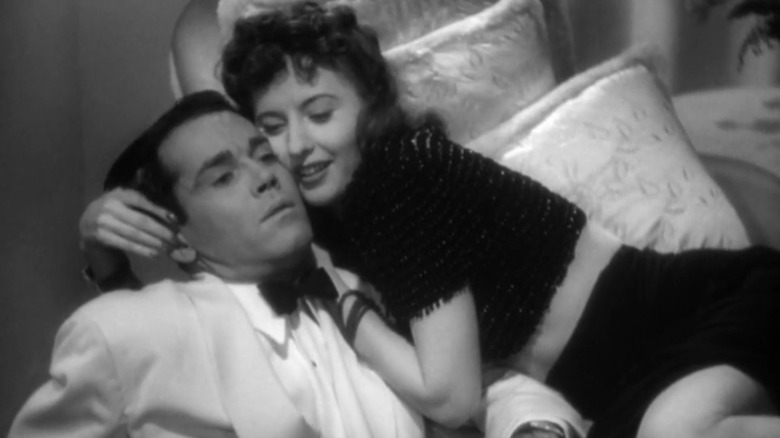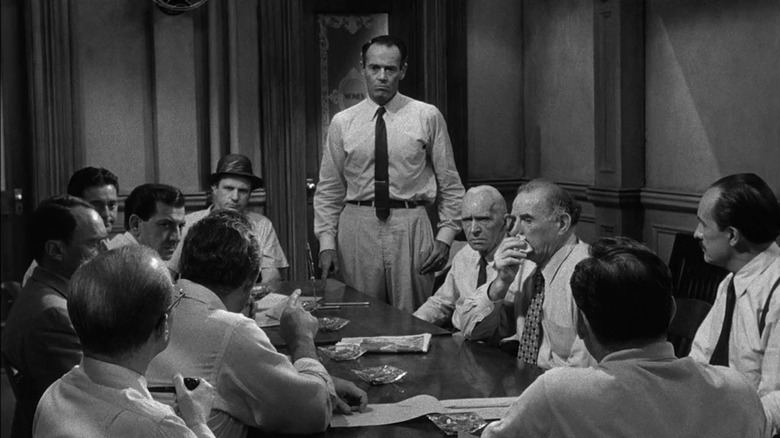10 Best Henry Fonda Movies, Ranked
Of all the actors from the Golden Age of Hollywood, Henry Fonda is unquestionably one of the most enduring. His career spanned the 1930s all the way through to the 1980s, giving him nearly 50 years in the spotlight. Although a less flashy performer than some of his contemporaries, his steadfast, dependable presence on screen made him one of the most beloved male stars of his day.
Fonda frequently took on noble, heroic roles, but that doesn't mean that he never dipped a toe into darker waters. In fact, some of his most memorable and critically acclaimed roles came from the actor's walk on the wild side, embracing morally grey characters if not out-and-out villains. His status as a universally beloved performer kept him in the industry for his entire adult life, and he became the patriarch of an entertainment industry family that included actors Jane and Peter Fonda. His filmography is packed full of gems from start to finish, but these are some of his very best roles.
10. Fail Safe
In the early 1960s, people were pretty keyed up over the idea of nuclear war. In 1962, the U.S. and the U.S.S.R. had come as close as ever to turning the Cold War into a blazing hot one with the Cuban Missile Crisis, and things were — to put it mildly — a little tense. Two years later, "Fail Safe" was released, a political thriller that gave voice to a nation's anxieties about nuclear annihilation. Based on a novel by Eugene Burdick and Harvey Wheeler, it revolves around the desperate attempts of the U.S. government to recall a group of planes en route to drop a nuclear bomb on Moscow, its original orders the product of a mechanical error.
After exhausting all other options, the president (Henry Fonda) is forced to make some serious sacrifices in order to prevent full nuclear annihilation. "Fail Safe" captures the mood of the moment, while Fonda is the perfect person to play the strong, thoughtful leader doing his best to avert disaster. And knowing now how close we actually came to nuclear war, with the revelation of the 1983 Soviet false alarm incident where a malfunctioning satellite defense system nearly led Russian forces to launch a retaliatory strike against a perceived American attack, the premise of "Fail Safe" is all the more chilling.
9. Young Mr. Lincoln
What's better than war-ravaged, presidential Abraham Lincoln? A young, handsome Abe at the start of his legal career, played by Henry Fonda with a truly unnerving prosthetic nose. "Young Mr. Lincoln," directed by John Ford, is an unabashedly sentimental look at the early life of one of America's most beloved presidents, exploring his brief romance with Ann Rutledge (Pauline Moore) before her untimely death, his early courtship of Mary Todd (Marjorie Weaver), and his involvement in a high-profile murder case. The earnest Henry Fonda is a perfect fit for Abraham Lincoln, imbuing him with intelligence, honor, and wit. (Although it did take some cajoling from John Ford to convince Fonda to take the part.)
Since Fonda was basically the Abraham Lincoln of Hollywood, it makes sense that he would deliver a compelling performance in the role. Although this iteration of Lincoln very much taps into the mythos of the former President rather than him as an actual person, audiences responded well to the film, and it was nominated for an Academy Award for Best Writing/Original Story.
8. The Ox-Bow Incident
Like many of the top stars of his day, Henry Fonda spent a decent amount of time acting in Westerns. In 1943, he played Gil in "The Ox-Bow Incident," one of the best films of its genre. He and Harry Morgan are cast as a pair of cowboys who enter a frontier town only to discover that one of its ranchers has been murdered and, as was the custom in the day, the local law enforcement arranges a posse to bring to justice those responsible.
But when they discover a trio of men (led by Dana Andrews) who seem to the fit the bill, they have to make the decision of whether to hang them or bring them back to town to face a trial. Even though they're not entirely sure if the men they've found actually committed the crime, the group votes for a lynching — a decision that may come to haunt them later. Confronting the idea of mob justice, "The Ox-Bow Incident" is an unusually introspective Western. It was nominated for Best Picture at the Academy Awards, making it one of the very few films to have its sole nomination be for the top prize.
7. Jezebel
Henry Fonda is the second lead in "Jezebel," but make no mistake: This is Bette Davis's film through and through. She stars as Julie Marsden, an impetuous Southern belle whose impulsive decisions lead to her downfall. In a key sequence in the film, she dons a bright red dress at an important ball, going against the expected attire of pure white for all unmarried women. Fonda plays Preston, her fiance, and the person she's seeking to punish by humiliating them both in public, and it's to no one's surprise that he breaks off their engagement as a result.
But although Julie acts destructively and without thought, she also regrets her choices, although her tragedy is that they can't be undone. Coming out in the late 1930s where there was strong demand for this type of elaborate costume drama (as proven by the earth-shattering success of "Gone With the Wind" the following year), "Jezebel" was nominated for five Academy Awards, ultimately winning for Best Actress (Bette Davis) and Best Supporting Actress (Fay Bainter).
6. The Grapes of Wrath
Based on the classic Depression-era novel by John Steinbeck, "The Grapes of Wrath" details the lives of a sharecropping Okie family who, after being defeated by the devastation of the Dust Bowl and the increased mechanization that makes their small farm model unprofitable, make their way to California. There, they hope to find greener pastures — California has long been promoted as a sort of promised land, and they go west with a sense of optimism about their future. But along the way, they meet with many trials and tribulations, all of which seemingly conspire to separate the once tight-knit Joad family.
Henry Fonda plays Tom Joad (a casting decision that was approved by Steinbeck himself), who has just been released from prison at the start of the film. "The Grapes of Wrath," like the novel it's based on, is a very socially conscious film that advocates for the rights of workers, which struck a chord with contemporary audiences. Widely considered one of the all-time greats, it was nominated for seven Academy Awards (including Fonda's first Best Actor nomination), ultimately winning two — Best Director for John Ford and Best Supporting Actress for Jane Darwell.
5. My Darling Clementine
When it comes to Western storytelling, the shootout at the O.K. Corral is to Western films as Bruce Wayne's parents' murder is to the superhero genre — directors just can't stop finding new ways to explore it on screen. In "My Darling Clementine," Henry Fonda stars as the stalwart Wyatt Earp alongside Victor Mature's Doc Holliday in the midst of the events leading up to the famous shootout.
But things hit a little bit of a bump when Clementine Carter (Cathy Downs) arrives from Boston, seeking her long-lost love — who is, as we learn, Doc Holliday himself. And the situation gets awkward when Wyatt starts to carry a torch for Clementine, attempting to court her in a clear violation of Guy Code. Directed by John Ford, "My Darling Clementine" is a more wistful, melancholy iteration of the traditional Western, setting its scene in the familiar environs of Tombstone, Arizona, but following an intimate and character-driven storyline. Now generally considered one of the best Westerns ever made, the impact of "My Darling Clementine" on the genre is broad and far-reaching, largely thanks to Henry Fonda's grounded performance as Wyatt Earp.
4. On Golden Pond
When classic Hollywood actors approached the end of their career, they'd often fallen in relevancy a bit, taking on roles in television movies or cameos in larger films that call back to their former fame. Henry Fonda, on the other hand, did some of the best work of his career just months before his 1982 death with "On Golden Pond." In it, he stars opposite his fellow Golden Age of Hollywood legend Katharine Hepburn, with the twosome playing an elderly couple on vacation at a picturesque lake house. Together, they grapple with both the challenges of aging and their complicated relationship with their daughter Chelsea (Jane Fonda, Henry's real-life daughter), who convinces them to allow her fiance's son Billy (Doug McKeon) to stay with them during the summer.
An unexpectedly sweet relationship develops between the grumpy, cynical Norman (Fonda) and Billy, whose youth brings a breath of a fresh air into the stuffy household, although Norman still represents a heartbreaking depiction of an old man clearly in decline. "On Golden Pond" earned 10 Academy Award nominations, including Best Adapted Screenplay, Best Actress for Hepburn, and Best Actor for Henry Fonda, marking the first competitive Oscar win of his career, although he did receive an Honorary Award in 1980. Sadly, Fonda was too unwell to attend the Academy Awards, where his daughter Jane accepted the award on his behalf, and he died from heart disease just five months later.
3. Once Upon a Time in the West
Over the course of Henry Fonda's career, he could usually be counted on to play the hero. Sometimes he was a little cynical, sometimes he had a bit of a bite to him, but it was very rare for him to play an out-and-out villain. That's what makes his performance in Sergio Leone's "Once Upon a Time in the West" so surprising — especially considering his long history with the genre, one that's incredibly fond of its black-and-white archetypes. He plays Frank, an outlaw and murderer who is at odds with Harmonica (Charles Bronson) for reasons that will become clear to us by the end of the film.
Unlike many of Fonda's non-heroic roles that just have a hint of a darker edge, Frank is a full-on bad guy. At first, he was reluctant to take on the role. But director Sergio Leone was able to convince him by setting the scene. "Picture this: The camera shows a gunman from the waist down pulling his gun and shooting a running child," he explained to Fonda, recounted in a retrospective by Scott Anthony. "The camera tilts up to the gunman's face and ... it's Henry Fonda."
2. The Lady Eve
When it comes to truly sexy Golden Age of Hollywood screwball comedies, "The Lady Eve" is in a class of its own. Charles (Henry Fonda) is the heir to a brewing company, but his main passion in life is the study of snakes; he's returning by ship to the United States after an expedition in South America. Jean (Barbara Stanwyck) is the daughter of a con man who makes it her mission to seduce Charles after learning about his family's fortune. And when she can't quite seal the deal the first time around, she takes on a new identity to get a second crack at Charles, posing as the wealthy, charming Lady Eve.
The chemistry between Fonda and Stanwyck is smoldering, especially when they first meet on the ship. And if Stanwyck's fake identity leaves much to be desired (she makes Clark Kent look like a master of disguise), we're willing to suspend our disbelief because of how well the two work together. At the 14th Academy Awards, "The Lady Eve" was nominated for Best Original Story, although it ultimately lost out to "Here Comes Mr. Jordan."
1. 12 Angry Men
An intimate, claustrophobic drama, "12 Angry Men" explores the preconceptions we have about certain people, and how willing we can be to judge based on those preconceptions. Henry Fonda stars as Juror #8 (each of the characters is only known by their designated numbers) on a high-profile murder trial of a teenage boy charged with killing his father. His fellow jurors are convinced of the boy's guilt, and all quickly vote to have him sentenced as such. Juror #8 stands alone, arguing that the least they can do is to talk through the case before sending the boy to his death or lifelong imprisonment.
But as they go through each piece of evidence, doubts begin to emerge among the jurors, causing tensions to ramp up in this hot, stuffy room filled with prejudices. This is one of Fonda's greatest pieces of acting, as he drives the action of the film while passionately arguing not necessarily that the boy is innocent, but that the only way to carry out justice properly is to take the responsibility of looking at the evidence seriously. "12 Angry Men" was nominated for three Academy Awards, including one for Best Picture, marking Fonda's second Oscar nomination, since he worked as a producer on the film.
